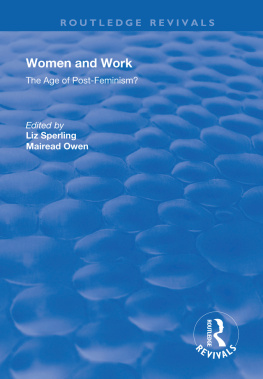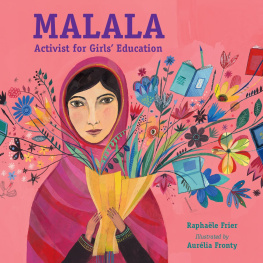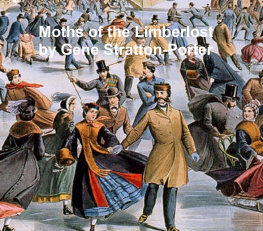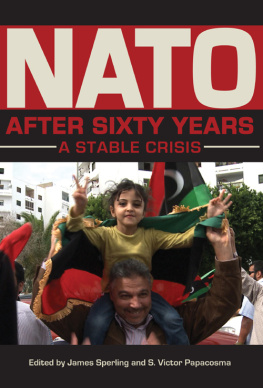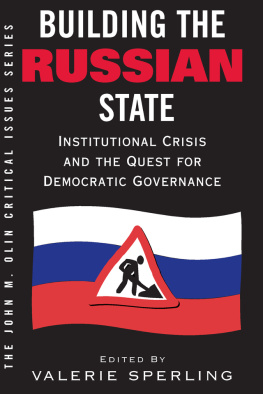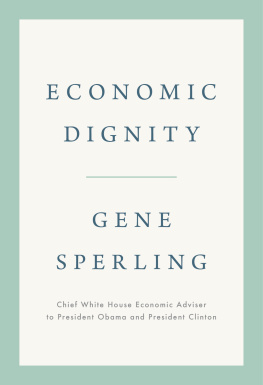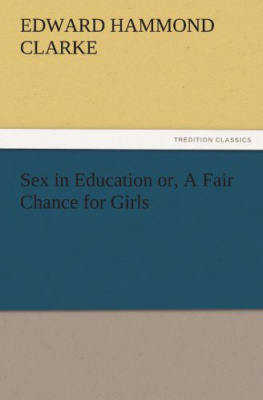WHAT WORKS IN GIRLS EDUCATION
Evidence
for the
World's Best
Investment
GENE B. SPERLING and REBECCA WINTHROP
With CHRISTINA KWAUK
Foreword by MALALA YOUSAFZAI
BROOKINGS INSTITUTION PRESS
Washington, DC
Copyright 2016
THE BROOKINGS INSTITUTION
1775 Massachusetts Avenue, N.W., Washington, D.C. 20036
www.brookings.edu
All rights reserved. No part of this publication may be reproduced or transmitted in any form or by any means without permission in writing from the Brookings Institution Press.
The Brookings Institution is a private nonprofit organization devoted to research, education, and publication on important issues of domestic and foreign policy. Its principal purpose is to bring the highest quality independent research and analysis to bear on current and emerging policy problems. Interpretations or conclusions in Brookings publications should be understood to be solely those of the authors.
Library of Congress Cataloging-in-Publication data is available.
978-0-8157-2860-3 (pbk. : alk. paper)
978-0-8157-2861-0 (epub)
978-0-8157-2862-7 (pdf)
9 8 7 6 5 4 3 2 1
Design and Composition by Chris Krupinski
To our mothers
To Doris Sperling, for 50 years as an education pioneer for equity and for assessing and teaching every child as an individual, for founding the Family Learning Institute, for improving the lives of countless students, and for being a hero to her children, grandchildren, and husband.
To Kathryn Winthrop, for loving, supporting, and empowering her daughters; for being a role model, showing that it is never too late to pursue your dreams and that success is possible as a woman in a man's world; and for making the world a better place through her preservation of our cultural heritage.
LIST OF FIGURES
LIST OF BOXES
Voices
Definitions
A Note on the Evidence
A Good Example
ACKNOWLEDGMENTS
Ten years ago, the Center for Universal Education, while based at the Council on Foreign Relations, produced What Works in Girls Education: Evidence and Policies from the Developing World, a compendium of the latest evidence on girls education coauthored by Barbara Herz and Gene B. Sperling. We start by thanking Barbara Herz not only for the intensive work she did over a decade ago coauthoring that book, but also for her decades of scholarship on girls education and the degree she inspired so many peopleincluding many top policy officialsto understand the importance of educating all girls everywhere. This book builds on that volume, capturing the learning from the past decade of scholarship, program innovations, policy experimentation, and evaluation on the topic of girls education. We hope that it will be just as useful as the first volume and serve as a guide to key topics for interested nonexperts and a catalogue of the latest data on what works to advance girls education for those who are helping to meet this global challenge.
We especially want to thank Malala Yousafzai for her interest in this book and for speaking out on behalf of all the girls in the world who are struggling to get an education. We greatly appreciate the Malala Fund's support in disseminating the results of this book, and we are deeply indebted to Meighan Stone for her ongoing collaboration on issues of girls education.
Many thanks to all those who provided invaluable guidance and input during the writing of this book. In particular, we are hugely indebted to those who reviewed drafts, shared their experiences and materials, and gave helpful suggestionsincluding Maria Andrawis, Zama Coursen-Neff, Julia Dicum, Caitlin Fowler, Nora Fyles, Dakmara Georgescu, Dileni Gunewardena, Maki Hayashikawa, Jennifer Hills, Catherine Howgego, Abid Hussain, Khadim Hussain, Maysa Jalbout, Lucy Lake, Cynthia Lloyd, Yolande Miller-Grandvaux, Shirley Miske, Kjersti Okkelmo, Alisa Phillips, Stephanie Psaki, Jamila Razzaq, Nicolas Reuge, Pauline Rose, Rosemary Rugamba-Rwanyange, Suman Sachdeva, Urvashi Sahni, Mioko Saito, Marni Sommer, Lakshmi Sundaram, Frances Vavrus, and Judith-Ann Walker. We are also grateful to our colleagues at the following organizations for providing collective feedback: the Africa Network Campaign on Education for All, FHI 360, the Forum of African Women Educationalists, the Global Partnership for Education, and Plan International.
We owe special thanks to Christina Kwauk, a skilled researcher with a doctorate in comparative and international development education, who throughout the writing of this book has demonstrated incredible professionalism and good humor. When we started the research for this book there was no plan to put her name on the cover, but after the tremendous contribution and insights she made we felt it was both fitting and deserved. We also want to extend our thanks to the very able research assistance we received from Romina da Costa, Elena Losada, Bridget McElroy, Eileen McGivney, and Emily Richardson. We would also like to thank Alfred Imhoff for his strategic advice and excellent assistance in finalizing this book, and to Renee McAlpin and Andrea Holcombe for their assistance in reviewing the final text. We are particularly grateful to our colleages at the Brookings Instititution and the Brookings Institution Press whose guidance and support were instrumental in bringing this book to fruition: Steven Bennett, William Finan, Jenifer Gamble, Valentina Kalk, Neil O'Reilly, and Janet Walker.
Finally, we want to thank our families(Allison, Miles, Nina, Derick, and Samantha for Gene) and (Santiago, Nico, Jean-Marc, and Anna for Rebecca)for their support and endless patience with us as we finished this book.
FOREWORD
My story is not of one girl but of many. It is the story of Malala from Pakistan. It is the story of the sisters I have met from Syria and Nigeria who have been denied an education or been targeted for going to school. It is the story of millions of sisters who I do not know by name, but who continue to struggle for what should rightfully be theirsa safe, free, quality education that allows them to fulfil their dreams and transform the places in which they live.
Every girl, no matter where she lives, no matter what her circumstance, has a right to learn. Every leader, no matter who he or she is or the resources available to him or her, has a duty to fulfil and protect this right. Unfortunately, many leaders are not taking this responsibility seriously. They spend their money in other ways. They identify the problem as too large, or the solutions as unclear, or the girls who miss out as deserving less than their own sons and daughters.
Getting millions of girls into school in the next 15 years may seem impossible but it is not. The challenge is significant but the world does not lack the funds or the knowledge to achieve 12 years of free, safe, quality primary and secondary education for every girland every boy.
We have shown how the necessary funding can be found. This book now shows what works to support girls education and helps us understand why. It also makes it clear that the world cannot achieve a sustainable, peaceful, and prosperous future without investing in girls education.
The world's leaders have just opened the door on a new future by agreeing to a set of ambitious goals for our people and planet. But these will not be achieved without investment in girls education. How can we all succeed when half of us are held back?



